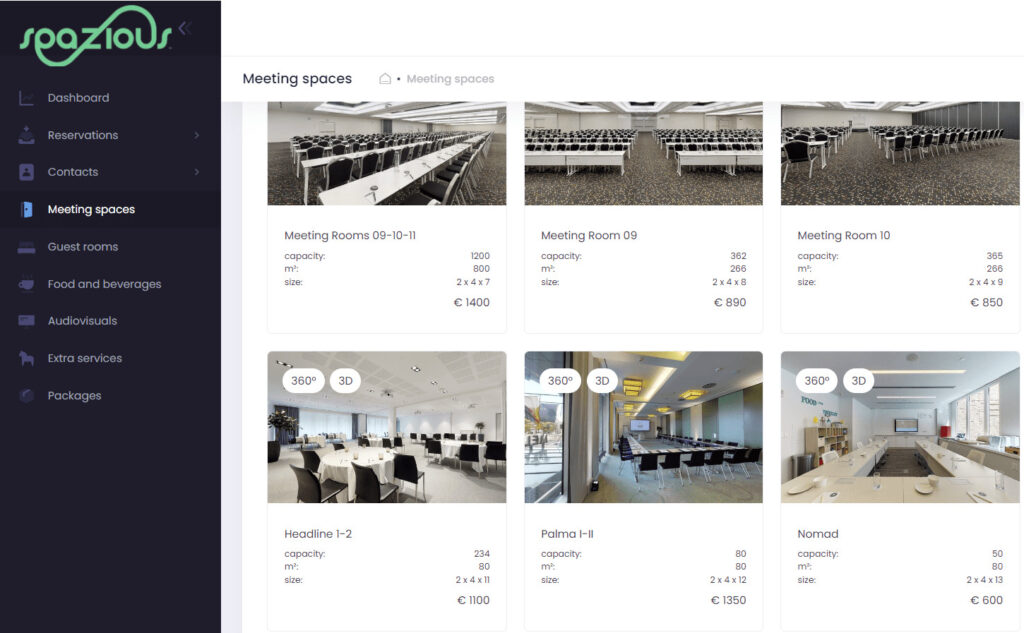Using an event scheduling software represents an ace in the hole for many leaders in the hospitality and event industry, particularly in the MICE segment. Today, many hotels and venues struggle to offer the most optimized experience for their clients. In addition, the implementation of an event management software often translates into frictionless, enhanced processes for businesses themselves.
Keep reading to find out what an event scheduling software exactly is, and how it’s enhancing organizations’ processes and their possibilities in providing outstanding experiences for their clients.
An event scheduling software is a digital tool that helps organizations plan, schedule, and manage events.
There are many types of event management software. Each company must choose the technology that best suits its needs. In the case of hotels and resorts that offer spaces for meetings and events, it is important to take into consideration the following points.
Mainly, a space for event management and hotel sales contacts. Also, a booking engine where you can close bookings instantly. In addition, the software must have functionalities that go beyond, and coordinate other services such as F&B, rooms, the set up of the event… And in many cases, it must be integrated with other hotel technologies (PMS, others…)
Some common features of an event scheduling software include:
Nowadays, some event management technologies include a 3D diagramming platform with which both hotels and clients can set up spaces. In fact, personalization makes clients be more interested in a specific product or service.
Many organizations are lagging behind in the implementation of event scheduling software. In fact, many are still mainly relying on offline processes or Excel sheets.
However, this trend might quickly transform in just a few years: 78% of hoteliers are planning to increase their investment in hotel tech in the next three years, according to the ‘Revenue Management Outlook & Trends Survey 2022’ published by Duetto.


In the commercialization of MICE business, event scheduling software can be a valuable asset for hotels. Firstly, they provide invaluable help in streamlining event management and reducing administrative burdens. Secondly, this technology helps optimize the sales team’s workload, while increasing the hotel’s revenue.
The following are the two most outstanding transformations and advantages that businesses typically experience when implementing an event scheduling software:
Companies should take these features into account when evaluating different event scheduling software options in order to select the best fit. Other considerations as part of a thorough research might also include:
Finally, accessing a demo for the platform can be a crucial step to pick the right tool.
Spazious offers an event scheduling software that combines the power of immersive technologies with the latest booking engine capabilities. Made by hoteliers for hoteliers, its design is based on +15 years of experience in operating online booking platforms.
This tool is able to transform how meetings, events & weddings are booked as a cloud-based solution that provides the most innovative features. All technology development tries to help hotels sell their spaces in a quicker and easier manner.
As such, it includes the following features:
Dynamic pricing module, helping companies and revenue management teams work on their long-term strategies.


We’ve already mentioned how an event scheduling software can bring a series of benefits for businesses. But this type of platform is also becoming a key component in enhancing customer experiences for attendees as well.
First of all, it provides a seamless registration process, as well as a platform for managing registration at any time. Secondly, it allows companies to customize the event experience for attendees, so that their preferences and particular requirements are met. Thirdly, the event scheduling software can also be a particularly efficient communication tool between event planners, attendees, and others such as vendors, reducing the risk of miscommunication. Finally, because it provides real-time updates, the platform can act as a central platform that keeps attendees informed at all times, reducing miscommunication risks.
Additionally, attendees will benefit from an improvement in the accuracy of scheduling and booking.
All in all, features such as real-time availability and automated tasks, as well as improved communication, will play a key role in enhancing overall customer experiences.
What is more, hotels and venues will see a boost to their productivity and efficiency and a thorough transformation in how they are able to book their event spaces. Take the next step and request a demo to experience the benefits of an event scheduling software by yourself.